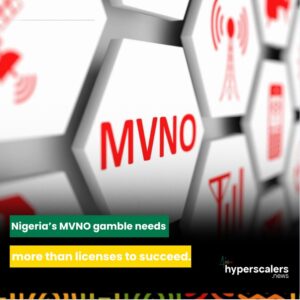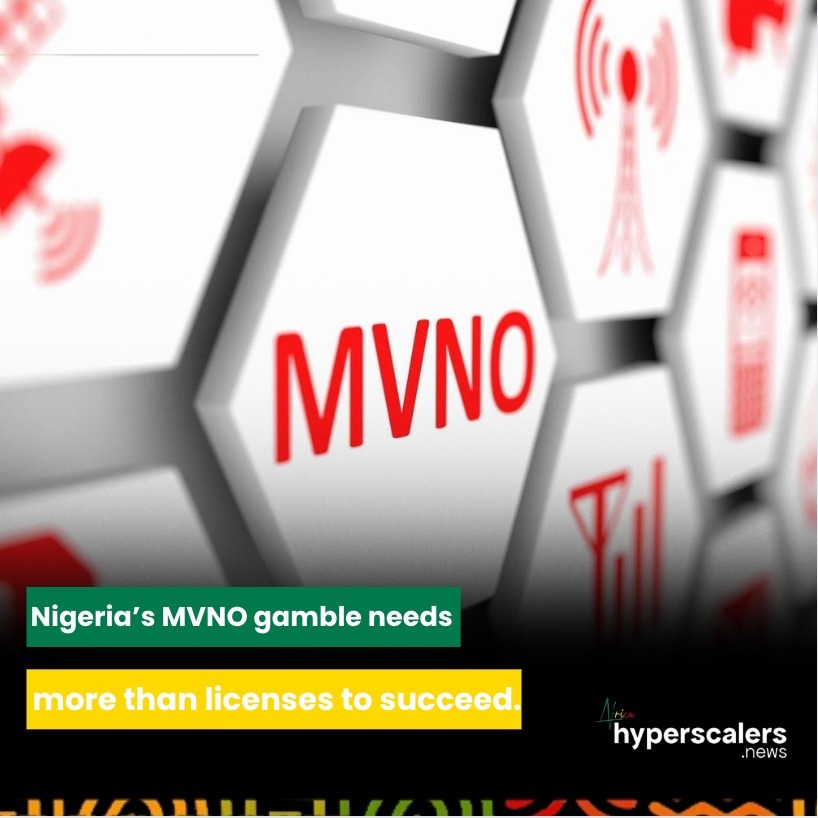In June 2023, Nigeria’s telecom regulator, the Nigerian Communications Commission (NCC), issued licenses to 25 Mobile Virtual Network Operators (MVNOs), followed by 18 additional approvals. It was a bold and long-overdue step. In a country of over 220 million people, where digital demand continues to outpace infrastructure and service quality – MVNOs offer a real opportunity to reset the dynamics of competition, pricing, and innovation in mobile connectivity.
Yet nearly two years later, the promise remains largely unfulfilled. The licenses were issued, but the ecosystem MVNOs need – wholesale access, regulatory enforcement, and, to some extent, digital infrastructure – remains underdeveloped. Without urgent reform, this second attempt at telecom liberalization risks becoming another missed opportunity.
Understanding MVNOs – and why they matter
Unlike traditional mobile network operators (MNOs), MVNOs do not own radio spectrum, towers, or fiber infrastructure. They lease network capacity from existing MNOs and compete through differentiation: lower-cost packages, niche product offerings, or superior customer service.
The model is far from speculative. In the United Kingdom, MVNOs account for over 15% of mobile subscriptions, with brands like Lebara, Tesco Mobile and Giffgaff thriving by targeting specific user segments. In South Africa, Cell C’s MVNO program helped launch fintech-integrated offerings like FNB Connect. In France, clear wholesale access regulations have allowed dozens of MVNOs to emerge and compete sustainably.
The common thread? Structure and oversight. Where regulators enforce fairness and access, MVNOs flourish. Where they don’t, the model falters.
Nigeria’s nascent MVNO market
On paper, Nigeria should be a dream market for MVNOs. Population and mobile penetration are high, but satisfaction and affordability lag. Demand exists for targeted bundles – for students, farmers, or diaspora users with purpose-built solutions. Yet, most of Nigeria’s licensed MVNOs have barely begun operations. Vitel Wireless, one of the more visible players, is running local ads but is yet to formally launch.
One bottleneck is network capacity. MVNOs succeed when host networks have excess to sell. That’s not the case in Nigeria. MTN, Airtel, Glo, and 9mobile operate in a bandwidth-tight environment. “MVNOs rely on existing Mobile Network Operators (MNOs) like MTN, Airtel, Glo, and 9Mobile to host them,” says Dr. Ayobami Oladejo, a telecoms strategist and Managing Director at Digipractice. “But here’s the catch… the host MNO must have excess network capacity – both for voice and data. For example, if Airtel has at least 20% surplus capacity, it can wholesale that excess to MVNOs, helping monetize its infrastructure investment.” Another executive adds: “If the host network is weak, the MVNO inherits the problem. Customers don’t care who owns the towers – they blame the brand they’re using.”
Beyond MNO reluctance, a larger issue is regulatory silence. While the NCC’s licensing framework requires MVNOs to enter into commercial wholesale agreements with host mobile operators, it stops short of providing standardized interconnection templates or enforceable guidelines. The absence of a uniform agreement framework has led to inconsistent negotiations and prolonged delays. Compounding the problem is the lack of MVNO-specific wholesale pricing benchmarks, a critical lever for ensuring fair competition. In markets like Spain and Germany, regulators have stepped in as active referees to level the playing field.
There’s also the issue of technical enablement. In mature markets, Mobile Virtual Network Enablers (MVNEs) handle backend functions such as billing, analytics, and customer management – allowing MVNOs to focus on service delivery rather than infrastructure. This layer is no longer a barrier in Nigeria. Robust cloud-based OSS/BSS platforms are now available, enabling MVNOs to launch quickly without the burden of building proprietary systems or grappling with legacy constraints. Interswitch’s Systegra has adopted the ConnectX platform by Amdocs, while Vas2Nets – backed by Lebara, has partnered with Swedish MVNE Telness. Both are already supporting MVNO rollouts in Nigeria with turnkey infrastructure that accelerates time to market.
The inclusion imperative

Nigeria’s digital exclusion crisis gives MVNOs greater relevance. According to GSMA, over 120 million Nigerians – more than 50% of the population – remain unconnected to mobile internet. The problem isn’t only coverage – it’s affordability, digital literacy, and the absence of tailored products.
MVNOs can help bridge that divide. They are uniquely suited to reach niche audiences traders, students, rural farmers and small businesses – with purpose-built solutions. If supported, they could act as catalysts for mobile adoption, particularly in communities the traditional telcos underserve. By introducing competitive pricing and niche offerings, MVNOs have the potential to connect an additional 20–30 million Nigerians within five years. This expansion would not only enhance connectivity but also stimulate economic growth.
Infrastructure is part of the story too. Nigeria has a staggering fiber gap. MVNOs can unlock co-investment models. By onboarding more market players, we invite more capital and innovation into last-mile connectivity. And as more Nigerians come online, data demand rises – driving growth in local cloud services, interconnection, and data center infrastructure. In this context, MVNOs aren’t just resellers. They are multipliers – a way to scale inclusion and deepen the digital economy without relying on state-led rollouts.
Same issues, different days
Still, some industry leaders caution against viewing MVNOs as a silver bullet. Olusola Teniola, former President of the Association of Telecommunications Companies of Nigeria (ATCON) and Director, Strategic Business Initiatives at ipNX, which has an MVNO Tier 3 license, offers a sobering perspective: “MVNO is not the holy grail it’s made out to be. The infrastructure deficit and lack of political will to support a robust and resilient enabling environment in Nigeria is very much evident,” he says. “There are elements within government trying to address it, but the status quo persists in how the telco industry – and the broader ICT ecosystem – is viewed by policymakers. These issues have existed since NITEL, through the CDMA era, the UASL regime, ISP spectrum access, and now MVNOs.”
Teniola argues that true digital inclusion will require far more than new licensing models: “Full convergence – triple play and beyond – demands a unified regulatory approach that transcends current frameworks. Addressing the digital divide and ensuring meaningful access will take more than an MVNO toolkit.” While reflective, his comments reflect a deeper industry concern: that MVNOs, while important, cannot substitute for systemic reform in infrastructure investment, market design, and long-term policy vision.
Hard decisions ahead
If Nigeria is serious about turning its MVNO policy into a functioning market, more needs to be done. The Nigerian Communications Commission needs to act not just as a gatekeeper, but as a market-maker – by publishing a reference wholesale pricing framework, enabling fair network access terms, and actively brokering relationships between MVNOs and mobile network operators. Without such intervention, fragmentation and inertia will prevail. Enterprise buyers – banks, fintechs, state agencies – must also play a catalytic role by integrating MVNOs into digital inclusion strategies that prioritize reach over rhetoric.
To move from policy to impact, wholesale pricing must be transparent and enforceable, eliminating the asymmetry that gives incumbents much leverage. Partnerships between MVNOs and host networks must be incentivized, and MVNOs must be positioned not as substitutes for legacy networks, but as strategic complements – built to innovate into the white spaces MNOs have left behind.
Frameworks… and incentives
For the Nigerian Communications Commission, enabling MVNOs is no longer regulatory housekeeping – it’s strategic self-preservation. With 43 licenses issued, the Commission faces a defining test: can it turn policy into performance? Failure could shelve meaningful telecom reform for another decade. A functional MVNO ecosystem would drive mobile adoption, widen the Commission’s influence in an evolving tech economy, attract infrastructure co-investment, and amplify demand for cloud, interconnection, and local data centers – multiplying growth across the digital economy. For MNOs, MVNOs offer new wholesale revenue streams and indirect access to niche markets they might otherwise ignore. But that market cannot exist in isolation. The MNOs – who’ve borne the cost of building towers, laying fiber, and absorbing regulatory friction – must see MVNOs as allies, not adversaries. That requires more than rules; it demands incentives: tax relief for shared infrastructure, spectrum perks for wholesale access, or universal service funds tied to MVNO partnerships. Innovation won’t flourish if the rails it rides are resentful. For the NCC, this is more than a licensing milestone – it’s an opportunity to rewire the industry for inclusion, innovation, and scale.
Your next move, Nigeria
Licensing 43 MVNOs was a bold first move by the NCC – made smarter by its tiered structure, which opened the door to a spectrum of operators, from resellers to full-core virtual networks. It was a flexible foundation meant to spur innovation without sacrificing oversight. But structure alone doesn’t scale markets. It needs fuel: enforceable wholesale terms, aligned incentives, and regulatory follow-through.
Since taking office, Dr. Aminu Maida has signaled a shift toward agile, innovation-led oversight – prioritizing quality of service, digital inclusion, and forward-looking frameworks around 5G, AI, and spectrum. With one foot in technology and the other in public service, he’s well placed to turn MVNO policy into performance. But it will take more than a promise. It will take political will, commercial clarity, and industry-wide coordination. The Federal Minister of Communications, Innovation and Digital Economy, Dr. Bosun Tijani, has already convened key stakeholders around digital inclusion. Now, with the right mandate, he can push the next phase: standardized wholesale agreements, meaningful incentives for MNOs, and enforceable access rules that transform policy into performance. His tenure offers a rare opportunity – not just to enforce compliance, but to create a truly competitive telecom marketplace.
Without structural reform and commercial safeguards, this MVNO initiative will stall. Given a fair operating environment, MVNOs can become one of the most effective levers for expanding access and deepening competition in this decade. The first step has been taken. The next ones will demand political resolve, regulatory precision, and industry-wide cooperation.
Nigeria: what’s your next move?





